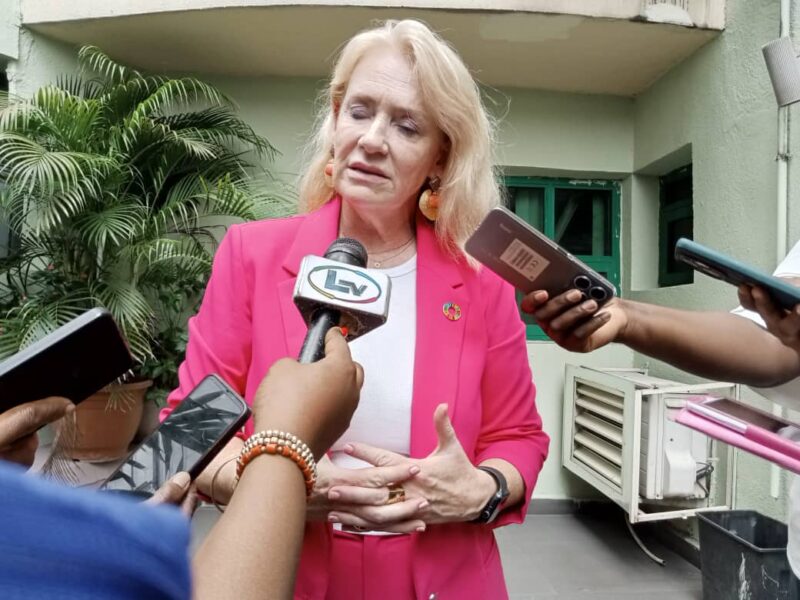1
Lagos – Birth registration is the first line of protection for every child. Without it, children cannot access healthcare, education, or social services. Without it, they are invisible.
This strong warning is the basis of a renewed partnership between the United Nations Children’s Fund (UNICEF) and the Lagos State Government, announced on Monday at the Lagos State Multi-Sectoral Stakeholders’ Dialogue on Birth Registration. The new campaign aims to register 545,000 newborns in Lagos before the end of 2025, a critical step in ensuring that no child is left behind.
Celine Lafoucriere, Chief of UNICEF Lagos Field Office, delivered a powerful message: “Every child’s right to identity begins with being registered at birth. Without registration, millions of Nigerian children remain invisible to the state.”

Lafoucriere commended Lagos for its leadership in the national campaign, noting that 94 percent of children under five in the state are already registered, one of the highest rates in Nigeria. Yet she was unequivocal: “Lagos State has made real progress. But the work is far from done. Hard-to-reach communities, informal settlements, and low-income families still face barriers. Our goal is to leave no child behind.”
In September 2025, the National Population Commission (NPC), with UNICEF’s support, began distributing over 16 million birth certificates nationwide. Lagos received the largest allocation—more than six million—underscoring both the scale of its achievement and the trust placed in its systems.
UNICEF’s current focus is on registering children under one year of age. Previous national drives had covered millions under five, with over 12 million children registered in the last three years. “This year, we’re concentrating on newborns because we should have far fewer unregistered under-fives now,” Lafoucriere explained. “The goal is to make birth registration second nature for every parent.”

The Cost Of Invisibility
The consequences of failing to register a child are severe and far-reaching. Lafoucriere warned that unregistered children are excluded from national statistics, which directly impacts social protection and development planning. “When you have a census or population survey, unregistered children do not exist. They are missing from budgets and social protection plans. Without legal identity, they can’t benefit from government programmes.”
She further highlighted the legal ramifications: “When you are a successor or heir, but you don’t have legal identity, you simply don’t exist in the eyes of the law. That can open the door to abuses.”
Lagos Ready For Action
Lafoucriere announced that all birth registration and health facility trainings have been completed across Lagos’ 20 Local Government Areas. Registration supplies, including tablets, have been distributed. “The foundation is in place. I can safely say that Lagos is ready,” she declared.
UNICEF is supporting an ambitious plan to register 3.69 million children under age one across 15 priority states in 2025. Lagos alone is targeting 545,000 newborns.
To achieve this, Lafoucriere called for cross-sectoral collaboration: “The Ministry of Health must integrate registration into immunisation and maternal health services. Education authorities must require birth certificates for school enrolment. Traditional and community leaders must champion registration as a civic duty. The media must amplify messages that resonate across our diverse communities.”
She also revealed that traditional birth attendants (TBAs) would be trained to register babies delivered outside hospitals, particularly in riverine and rural communities.
Community Mobilisation Is Crucial
Federal Commissioner of the NPC in Lagos, Mrs Olayinka Oladunjoye, echoed the urgency of the campaign. “Without registration, there is no identity. And without identity, we can’t plan for them,” she said.
Oladunjoye stressed that accurate registration data enables effective planning for schools, healthcare facilities, and infrastructure. “If you know the number of children born in a place like Mushin, you can plan how many schools or health centres to build. That is why this is so important.”
She commended UNICEF, ALGON, and other partners for their continued collaboration, describing the campaign as a shared responsibility. “All our children must be registered, and certificates must be given. We appreciate UNICEF for being a strong partner and for always standing by us.”
Bottlenecks And Solutions
Mrs Olajumoke Otitoloju, Welfare Officer for the Child Protection Network (CPN) and Project Coordinator for Yanuora Children’s Care Foundation, addressed the persistent barriers to universal registration. “Birth registration is the first legal identity of a child’s existence in the community. When a child is not registered, that child is invisible. Millions of children in rural and low-income areas still fall through the cracks.”
Otitoloju identified lack of awareness as a major bottleneck. “We don’t have enough campaigns or awareness for parents and caregivers on the importance of birth registration. Because of this, many do not see why it matters.”
She also raised alarm over unofficial personnel who exploit the system. “Although birth registration is free, some unofficial personnel charge parents or issue fake certificates, discouraging genuine registration. This must be addressed.”
Otitoloju called for stronger collaboration among government ministries, agencies, health workers, and civil society to strengthen data collection and policy planning. “When we have accurate data of children, the government can make policies that favour their welfare. But when a child is not registered, that child doesn’t exist in the system.”
Way Forward
To improve compliance, Otitoloju proposed establishing birth registration desks in primary schools. “When a child is admitted into school without a birth certificate, parents should be directed to register immediately.”
She also urged faith-based organisations to demand proof of registration during naming ceremonies. “If churches and mosques request for birth certificates before naming a child, it will help families understand its importance. It’s not just about giving a name, it’s about giving an identity.”
A Unified Front For Every Child
The dialogue, themed “Every Child Counts: Accelerating Birth Registration in Lagos State,” brought together officials from the Ministries of Health, Education, Youth and Social Development, ALGON, traditional and religious leaders, civil society, and the media.
Participants resolved to co-create a Lagos State Birth Registration Action Plan to strengthen awareness, integrate registration into healthcare and education systems, and achieve measurable results by year-end.
As UNICEF and Lagos State intensify efforts to register 545,000 newborns, both partners are determined to ensure that no child should be invisible. Birth registration is not a bureaucratic formality, it is a fundamental right, a shield of protection, and the gateway to every opportunity a child deserves.







